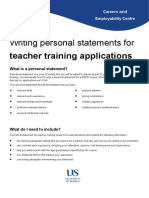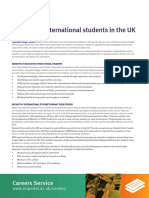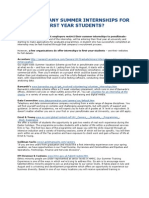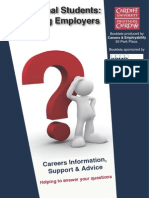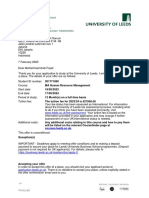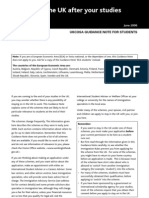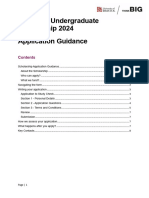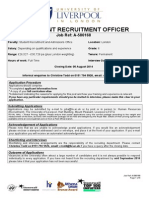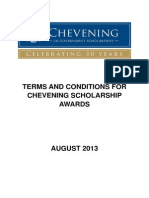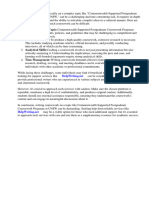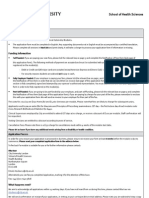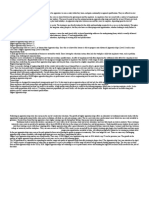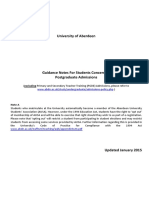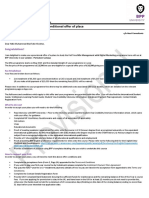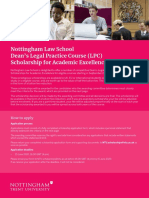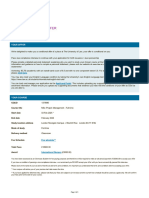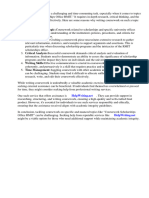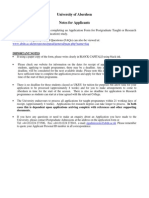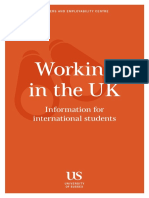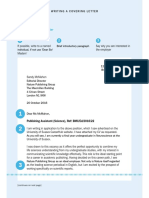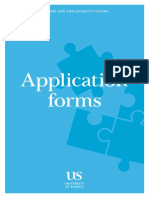0 ratings0% found this document useful (0 votes)
27 viewsGuide To Visas and Immigration: International Students
Guide To Visas and Immigration: International Students
The document discusses visa options for international students in the UK. As a student, you would typically have a Tier 4 visa. There are five types of visas: Tier 1 for exceptional talent/investors; Tier 2 for skilled workers; Tier 3 for temporary labor (not currently used); Tier 4 for students; and Tier 5 for temporary workers. For work after graduation, students can apply for Tier 2 visas if they have a job offer from an approved employer. The Careers and Employability Centre can help students develop skills and find employment opportunities in the UK.
Copyright:
© All Rights Reserved
Available Formats
Download as PDF, TXT or read online from Scribd
Guide To Visas and Immigration: International Students
Guide To Visas and Immigration: International Students
0 ratings0% found this document useful (0 votes)
27 views4 pagesThe document discusses visa options for international students in the UK. As a student, you would typically have a Tier 4 visa. There are five types of visas: Tier 1 for exceptional talent/investors; Tier 2 for skilled workers; Tier 3 for temporary labor (not currently used); Tier 4 for students; and Tier 5 for temporary workers. For work after graduation, students can apply for Tier 2 visas if they have a job offer from an approved employer. The Careers and Employability Centre can help students develop skills and find employment opportunities in the UK.
Original Description:
Information about visas
Original Title
Visa
Copyright
© © All Rights Reserved
Available Formats
PDF, TXT or read online from Scribd
Share this document
Did you find this document useful?
Is this content inappropriate?
The document discusses visa options for international students in the UK. As a student, you would typically have a Tier 4 visa. There are five types of visas: Tier 1 for exceptional talent/investors; Tier 2 for skilled workers; Tier 3 for temporary labor (not currently used); Tier 4 for students; and Tier 5 for temporary workers. For work after graduation, students can apply for Tier 2 visas if they have a job offer from an approved employer. The Careers and Employability Centre can help students develop skills and find employment opportunities in the UK.
Copyright:
© All Rights Reserved
Available Formats
Download as PDF, TXT or read online from Scribd
Download as pdf or txt
0 ratings0% found this document useful (0 votes)
27 views4 pagesGuide To Visas and Immigration: International Students
Guide To Visas and Immigration: International Students
The document discusses visa options for international students in the UK. As a student, you would typically have a Tier 4 visa. There are five types of visas: Tier 1 for exceptional talent/investors; Tier 2 for skilled workers; Tier 3 for temporary labor (not currently used); Tier 4 for students; and Tier 5 for temporary workers. For work after graduation, students can apply for Tier 2 visas if they have a job offer from an approved employer. The Careers and Employability Centre can help students develop skills and find employment opportunities in the UK.
Copyright:
© All Rights Reserved
Available Formats
Download as PDF, TXT or read online from Scribd
Download as pdf or txt
You are on page 1of 4
Internatonal students:
Guide to visas and immigraton
The UK Government operates a Points Based System (PBS) to determine who can work, study
or visit the UK. If you wish to work in the United Kingdom on completion of your studies you will
need to apply for an appropriate Visa. There are five different types of Visa.
As a student you would usually have a Tier 4 Visa. If you have another type of Visa you
will need to check if it is possible to change to a work Visa within the UK by emailing
immigration@sussex.ac.uk with your details.
Tier 1 - Immigration routes available for exceptional talent, investors, and
entrepreneurs
Tier 2 - Skilled workers with a job offer
Tier 3 - Workers filling specific temporary labour shortages (not currently in use)
Tier 4 - Students
Tier 5 - Temporary workers, for example participants in the youth mobility scheme or
through government authorised exchange
For more information go to the points-based calculator on the UKBA website:
ukba.homeoffice.gov.uk/pointscalculator
Tier 1 (Graduate Entrepreneur) a new scheme is being introduced for those who have
been identified by UK universities as having developed world-class innovative ideas or
entrepreneurial skills, but who are not yet in a position to meet the full requirements of
the Tier 1 (Entrepreneur) route. The University of Sussex does not meet the qualifying
criteria, so this is not an option in 2012/2013.
Tier 2 (General) Visas are open to recent graduates with a Bachelor's or Master's
degree, PhD, or a PGCE or PGDE, from a UK recognised or listed body. To obtain a
Tier 2 (General) Visa:
If you were studying at undergraduate level you must have been awarded your
degree. (If you are a PhD student you can apply once you have studied for at least 12
months).
You must have an job offer for a graduate level job from an employer who has
registered with UKBA to become a Tier 2 licensed sponsor and who is therefore
able to offer you a Certificate of Sponsorship (CoS). [The CoS is an electronic
database record issued by the UKBA to your Tier 2 employer Sponsor and you
will be given a unique number associated with your CoS for the graduate level
job]
The graduate level job you are being offered must have a minimum salary offer of
20,700 per year and meet the salary Tier 2 (General) Visa specifications
detailed in the codes of Practice on the UKBA website bit.ly/UKBA-sussex
You will need to hold 900 in your own bank account for a period of 90
consecutive days and you are advised to open a savings account solely for this
purpose
You will have to get 70 points to meet the Tier 2 (General) Points Based system
For more information about the Tier 2 Visa, see the International & Study Abroad Office
website sussex.ac.uk/International/admissions/employment.shtml
If you make your application in the UK before your Tier 4 student Visa expires, the employer
will not have to meet what is known as a resident labour market test (to show the UKBA they
have been unable to fill the position by a resident worker) and there is no requirement for the
job to be on the shortage occupation list.
For further information go to ukcisa.org.uk/student/working_after.php
If you have any further questions, you can email: immigration@sussex.ac.uk
30 points for your Certificate of Sponsorship (CoS)
20 points for your salary of 20,500+ (or an appropriate rate of pay)
10 points for having sufficient savings
10 points for speaking English
There is a points-based calculator on the UKBA web site:
ukba.homeoffice.gov.uk/pointscalculator
Tips for Finding Work in the UK
The Careers and Employability Centre can help you to manage your career successfully,
from developing and selling your skills to supporting your job search strategy and providing
you with opportunities. Talk to our advisers, come to our events, and use our online resources!
1. Target firms that are already on the register of Tier 2 sponsors bit.ly/UKBA-list
2. Once you have been given a CoS job offer, you can apply for permission to stay in the
UK and work for that organisation for up to three years (with the possibility of extending
your stay for a further two years)
3. Direct any employer not currently on the register to the UKBAs information on joining
the register of Tier 2 sponsors bit.ly/UKBAsponsors
4. Research the employer carefully. Think about how to provide evidence of your suitability
for a position and how you might contribute to the employers future success. We can
help you with this
5. Network. Use any contacts, through work or study, to help you make a personal
approach to particular employers.
Use sussex.ac.uk/careers/jobs/creativejobsearch for advice about networking
6. Use our Employability Accelerator Programme of events to meet and network with
employers and Sussex University alumni. We also offer a wide range of skills
workshops, led by employers and career experts. Book your place at
sussex.ac.uk/careers/newsandevents/events
7. The Employability Accelerator Programme will help you to develop your skills,
personal qualities and confidence and to understand what UK and international
companies are looking for in future graduate recruits. This will help maximise your
employability prospects
8. Explore the different kinds of graduate recruitment schemes in the UK and
internationally
9. Keep your options open. Include applying for options in your home country or exploring
other opportunities to work in the global labour market. We can help you with your job
search strategy
10. Keep in touch with us. We are on Twitter @SussxUniCareers and
Facebook.com/sussexcareers. Our news page will keep you up-to-date with the
latest career tips and opportunities at sussex.ac.uk/careers/newsandevents
11. . You can also sign up to get vacancies emailed to you directly from
sussex.ac.uk/careers/jobs/, or set up your own RSS feeds to automate your job
search
Currently around 26,500 employers are registered as Tier 2 licensed sponsors
Many of the employers at our Graduate Fairs are already Tier 2 sponsors; including
Amex, Baker Tilley, Deloitte, Grant Thornton, Santander, Accenture, Capgemini,
Cummins, Edwards, FDM group, General Electric, Logica, and Mitsubishi
A recent report, Global Graduates into Global Leaders (2011) identifies the skills, knowledge,
and attitudes required in the global world of work and comments:
The market for high-skilled graduates is becoming increasingly global... Globalised
businesses require talent to compete in global marketplaces and have higher
expectations of graduates. The significant growth and development in emerging markets,
particularly the BRIC (Brazil, Russia, India and China) nations, means that to complete
effectively UK organisations must take the global view and seek out new opportunities in
these markets.
You can read the report at:
bit.ly/CIHEreport
The Careers and Employability Centre
The Library, University of Sussex, Brighton,
Phone: 01273 678429
E-mail: careers@sussex.ac.uk
www.sussex.ac.uk/careers
Facebook: Facebook.com/SussexCareers
Twitter: @SussxUniCareers
You might also like
- The Ultimate UCAT Collection: 3 Books In One, 2,650 Practice Questions, Fully Worked Solutions, Includes 6 Mock Papers, 2019 Edition, UniAdmissions Aptitude Test, UniAdmissionsFrom EverandThe Ultimate UCAT Collection: 3 Books In One, 2,650 Practice Questions, Fully Worked Solutions, Includes 6 Mock Papers, 2019 Edition, UniAdmissions Aptitude Test, UniAdmissionsRating: 4 out of 5 stars4/5 (1)
- The Ultimate UKCAT Guide: 1250 Practice QuestionsFrom EverandThe Ultimate UKCAT Guide: 1250 Practice QuestionsRating: 5 out of 5 stars5/5 (1)
- Offer Letter 25006543Document2 pagesOffer Letter 25006543Prerna 21HMT3167No ratings yet
- Personal Statement For Teacher TrainingDocument4 pagesPersonal Statement For Teacher TrainingThe University of Sussex Careers and Employability CentreNo ratings yet
- Personal Statement For Teacher TrainingDocument4 pagesPersonal Statement For Teacher TrainingThe University of Sussex Careers and Employability CentreNo ratings yet
- Fatema - 2167025Document7 pagesFatema - 2167025Mehedi HasanNo ratings yet
- %offerDocument7 pages%offerMiani ShiraNo ratings yet
- Graduate Cover LetterDocument1 pageGraduate Cover LetterThe University of Sussex Careers and Employability CentreNo ratings yet
- Employing International StudentsDocument3 pagesEmploying International StudentsMaaz SarfarazNo ratings yet
- UK Global Talent Steps To Securing The UK Global Talent Visa As A Digital MarketerDocument5 pagesUK Global Talent Steps To Securing The UK Global Talent Visa As A Digital Marketerolajideojo97No ratings yet
- Tier 1 SampleDocument5 pagesTier 1 Samplerohail51No ratings yet
- Resources and FAQsDocument2 pagesResources and FAQsNanyi MateoNo ratings yet
- InternshipDocument2 pagesInternshipRishita SharmaNo ratings yet
- Think Big Postgraduate Scholarship Application GuidanceDocument8 pagesThink Big Postgraduate Scholarship Application Guidanceshimron844No ratings yet
- ISnewsletterSept2014Academic ZebraDocument2 pagesISnewsletterSept2014Academic ZebraThe University of Sussex Careers and Employability CentreNo ratings yet
- Commonwealth Scholarship Thesis GrantDocument7 pagesCommonwealth Scholarship Thesis Grantafjrtdoda100% (2)
- International Students Identifying Employers by ARW July12Document29 pagesInternational Students Identifying Employers by ARW July12Rudmila AhmedNo ratings yet
- PGT Offer Letter-1Document4 pagesPGT Offer Letter-1Faizal Umar KhadafiNo ratings yet
- Work After GraduateDocument12 pagesWork After Graduatelonner0No ratings yet
- Think Big Undergraduate Scholarship Application GuidanceDocument8 pagesThink Big Undergraduate Scholarship Application Guidanceinfopay38No ratings yet
- Uk-student-recruitment-Officer London Srao ToddDocument5 pagesUk-student-recruitment-Officer London Srao ToddmistryhNo ratings yet
- LLDCRecruitmentPack FinanceApprenticeDocument12 pagesLLDCRecruitmentPack FinanceApprenticeronnoc.s.gNo ratings yet
- Accountancy and TaxDocument5 pagesAccountancy and TaxetyuNo ratings yet
- Retirement Provision Certificate LeafletDocument3 pagesRetirement Provision Certificate LeafletDianne WhiteNo ratings yet
- Sector Financial Services FebruaryDocument2 pagesSector Financial Services Februarybojan60No ratings yet
- Scholarship CheveningDocument21 pagesScholarship CheveningLove SharmaNo ratings yet
- Getting Work ExperienceDocument7 pagesGetting Work ExperienceDalia AlbuNo ratings yet
- Learning Info Sheets AccountancyDocument9 pagesLearning Info Sheets AccountancygavinckoNo ratings yet
- HR7 CHOUDHARY in+Energy+Management+of+Non-Domestic+BuildingsDocument6 pagesHR7 CHOUDHARY in+Energy+Management+of+Non-Domestic+BuildingsNeha SuriNo ratings yet
- Chevening Scholarships: Who Can Apply?Document5 pagesChevening Scholarships: Who Can Apply?AlinaasirNo ratings yet
- The UK Work Visa Blueprint: Legacy Education and Professional Services Ltd. 10/10/2022Document44 pagesThe UK Work Visa Blueprint: Legacy Education and Professional Services Ltd. 10/10/2022Cliff AkasNo ratings yet
- Guidance Notes For Applicants Oct 2020 En-CyDocument16 pagesGuidance Notes For Applicants Oct 2020 En-CyAbeer AlrofaeyNo ratings yet
- Commonwealth Supported Postgraduate Coursework Programs UnswDocument6 pagesCommonwealth Supported Postgraduate Coursework Programs Unswf5df0517100% (1)
- Chevening Guide UK Applicants MastersDocument38 pagesChevening Guide UK Applicants MastersFelipeRosadoNo ratings yet
- Commonwealth Supported Postgraduate Coursework Programs UqDocument6 pagesCommonwealth Supported Postgraduate Coursework Programs Uqafjweyxnmvoqeo100% (1)
- INTERVIEWDocument7 pagesINTERVIEWJAGDEEP KAURNo ratings yet
- UK Skilled Worker Visa Sponsorship Near MeDocument11 pagesUK Skilled Worker Visa Sponsorship Near MeshravaniNo ratings yet
- Congratulations On Your Offer!: WatchDocument8 pagesCongratulations On Your Offer!: WatchAlvina RNo ratings yet
- Decision Letter For Fathima Kulakka Moole - 2023 Intake - International Requires Student VisaDocument4 pagesDecision Letter For Fathima Kulakka Moole - 2023 Intake - International Requires Student Visafathimakm550No ratings yet
- MSC Clinical Optomertry Application FormDocument7 pagesMSC Clinical Optomertry Application FormbrainhighwayNo ratings yet
- Print Student Visa - GOV - UKDocument19 pagesPrint Student Visa - GOV - UKAshirwad BehuraNo ratings yet
- J228APPRENTDocument2 pagesJ228APPRENTAhmad ZaareerNo ratings yet
- University of Leeds - Study - Masters Courses - Applying - How To Apply For Masters CoursesDocument5 pagesUniversity of Leeds - Study - Masters Courses - Applying - How To Apply For Masters CoursesGERY RANo ratings yet
- UK Skilled Worker Visa Sponsorship Near MeDocument11 pagesUK Skilled Worker Visa Sponsorship Near Merahul maginificNo ratings yet
- UK Skilled Worker Visa SponsorshipDocument11 pagesUK Skilled Worker Visa Sponsorshiprahul maginificNo ratings yet
- Lawyer Learning PlanDocument4 pagesLawyer Learning Planfatma özdemirNo ratings yet
- Admissions PG GuidelinesDocument13 pagesAdmissions PG GuidelinesDidi AuliaNo ratings yet
- MidCo Care Senior Carer Skilled Worker Role (UK Students)Document2 pagesMidCo Care Senior Carer Skilled Worker Role (UK Students)Benedict MuringakumweNo ratings yet
- International Postgraduate Scholarships: How To ApplyDocument5 pagesInternational Postgraduate Scholarships: How To Applyمحمد ہارونNo ratings yet
- Youth Contract FactsheetDocument2 pagesYouth Contract FactsheetcrockartmpNo ratings yet
- DR Rachel Carr, Chief Executive Officer and Co-FounderDocument7 pagesDR Rachel Carr, Chief Executive Officer and Co-FounderErmintrudeNo ratings yet
- Hafiz Muhammad Bilal Tahir Khokhar AP1078609 OfferDocument2 pagesHafiz Muhammad Bilal Tahir Khokhar AP1078609 Offerbook junctionNo ratings yet
- LPC Scholarship Form NTU PDFDocument4 pagesLPC Scholarship Form NTU PDFAyylmaokidNo ratings yet
- D5904-11 Acco Fin Prog WEBDocument6 pagesD5904-11 Acco Fin Prog WEBMoyo ZibangNo ratings yet
- Admissions_1373986_OfferLetter_20241004104601Document3 pagesAdmissions_1373986_OfferLetter_20241004104601prabhatthapa522No ratings yet
- Sunpreet Kaur - UCODocument4 pagesSunpreet Kaur - UCOKaynat ESA0% (1)
- Guidance For ApplicantsDocument32 pagesGuidance For ApplicantssaqibafaqNo ratings yet
- Coursework Scholarships Office RmitDocument7 pagesCoursework Scholarships Office Rmitfzdpofajd100% (2)
- Applicant Guidance Notes - Leaders in Innovation Fellowships Programme 2018/19Document17 pagesApplicant Guidance Notes - Leaders in Innovation Fellowships Programme 2018/19Jorge Alfredo HuarachiNo ratings yet
- Making The Most of Your First YearDocument8 pagesMaking The Most of Your First YearThe University of Sussex Careers and Employability CentreNo ratings yet
- Chevening ScholarshipDocument38 pagesChevening Scholarshipaforall123100% (2)
- Employer Sponsorship Template MpaccountancyDocument11 pagesEmployer Sponsorship Template MpaccountancyShehzaib TariqNo ratings yet
- University of Aberdeen Notes For Applicants: WWW - Abdn.ac - Uk/prospectus/pgrad/general/page - Php?name FaqDocument6 pagesUniversity of Aberdeen Notes For Applicants: WWW - Abdn.ac - Uk/prospectus/pgrad/general/page - Php?name FaqIndira ZhumartovaNo ratings yet
- Part Time WorkDocument4 pagesPart Time WorkThe University of Sussex Careers and Employability CentreNo ratings yet
- Working in The UKDocument8 pagesWorking in The UKThe University of Sussex Careers and Employability CentreNo ratings yet
- Example of A Chronological CVDocument2 pagesExample of A Chronological CVThe University of Sussex Careers and Employability CentreNo ratings yet
- Part Time Work Nov17vF PDFDocument2 pagesPart Time Work Nov17vF PDFThe University of Sussex Careers and Employability CentreNo ratings yet
- Example of A Covering Letter: (Continues On Next Page)Document2 pagesExample of A Covering Letter: (Continues On Next Page)The University of Sussex Careers and Employability CentreNo ratings yet
- Example of A Chronological CVDocument2 pagesExample of A Chronological CVThe University of Sussex Careers and Employability CentreNo ratings yet
- CVs and Covering LettersDocument12 pagesCVs and Covering LettersThe University of Sussex Careers and Employability CentreNo ratings yet
- Explore Your Options: ScienceDocument4 pagesExplore Your Options: ScienceThe University of Sussex Careers and Employability CentreNo ratings yet
- Part-Time WorkDocument4 pagesPart-Time WorkThe University of Sussex Careers and Employability CentreNo ratings yet
- Our Services For ResearchersDocument4 pagesOur Services For ResearchersThe University of Sussex Careers and Employability CentreNo ratings yet
- Explore Your Options: ScienceDocument4 pagesExplore Your Options: ScienceThe University of Sussex Careers and Employability CentreNo ratings yet
- Application Forms: Careers and Employability CentreDocument8 pagesApplication Forms: Careers and Employability CentreThe University of Sussex Careers and Employability CentreNo ratings yet
- The Zebra - Staff Newsletter Autumn 2013Document2 pagesThe Zebra - Staff Newsletter Autumn 2013The University of Sussex Careers and Employability CentreNo ratings yet
- Speculative LetterDocument1 pageSpeculative LetterThe University of Sussex Careers and Employability CentreNo ratings yet
- ISnewsletterSept2014Academic ZebraDocument2 pagesISnewsletterSept2014Academic ZebraThe University of Sussex Careers and Employability CentreNo ratings yet
- Academic CVsDocument8 pagesAcademic CVsThe University of Sussex Careers and Employability CentreNo ratings yet
- Graduate Skills Based CVDocument2 pagesGraduate Skills Based CVThe University of Sussex Careers and Employability CentreNo ratings yet
- Writing Personal Statements For Postgraduate StudyDocument2 pagesWriting Personal Statements For Postgraduate StudyThe University of Sussex Careers and Employability CentreNo ratings yet
- Example Placement Chronological CV and Covering LetterDocument4 pagesExample Placement Chronological CV and Covering LetterThe University of Sussex Careers and Employability CentreNo ratings yet



